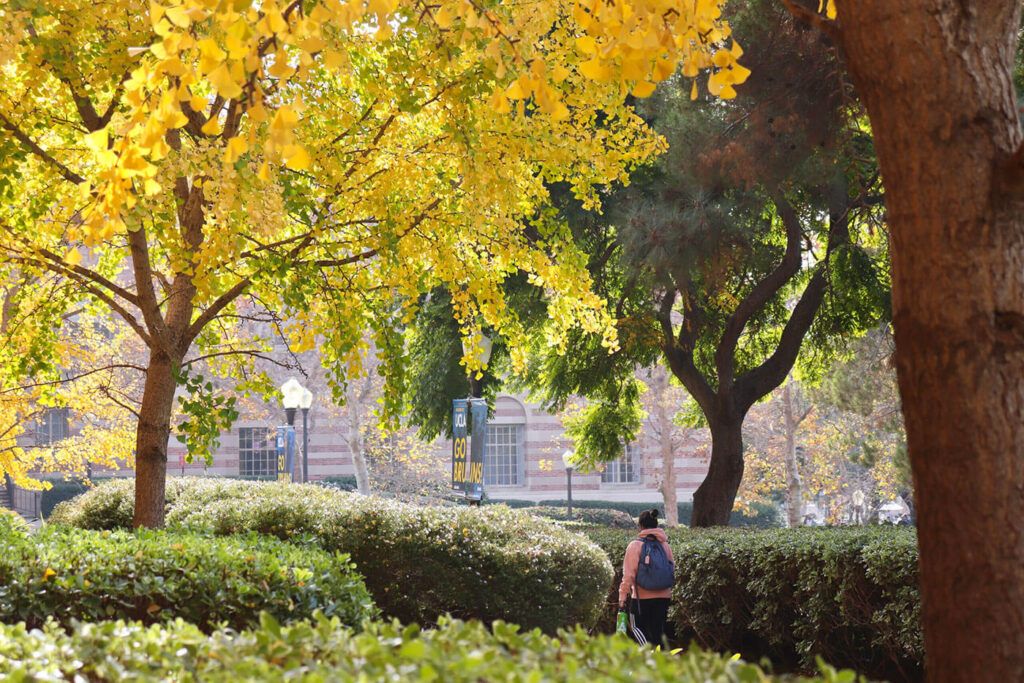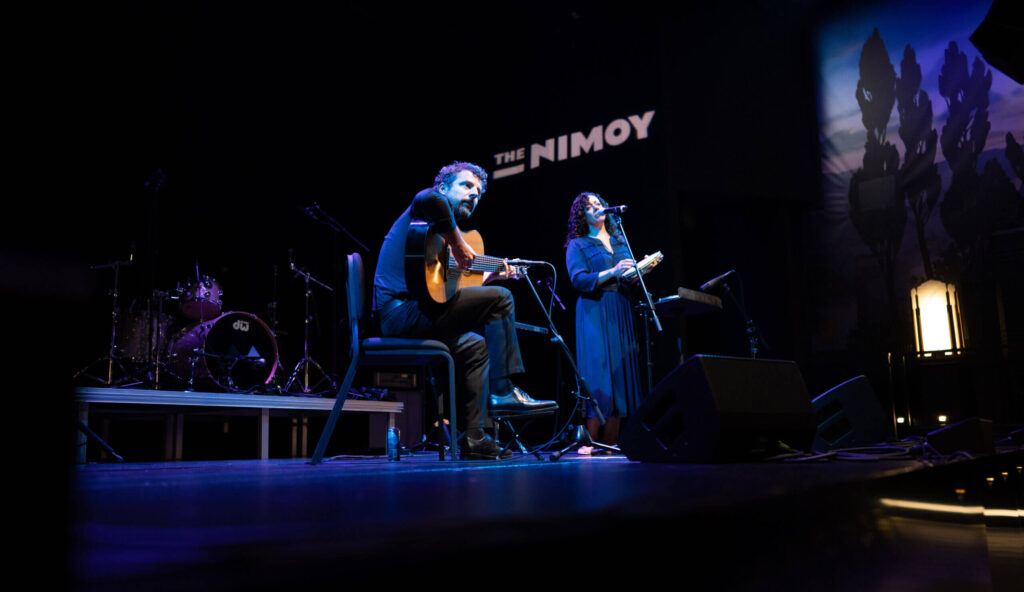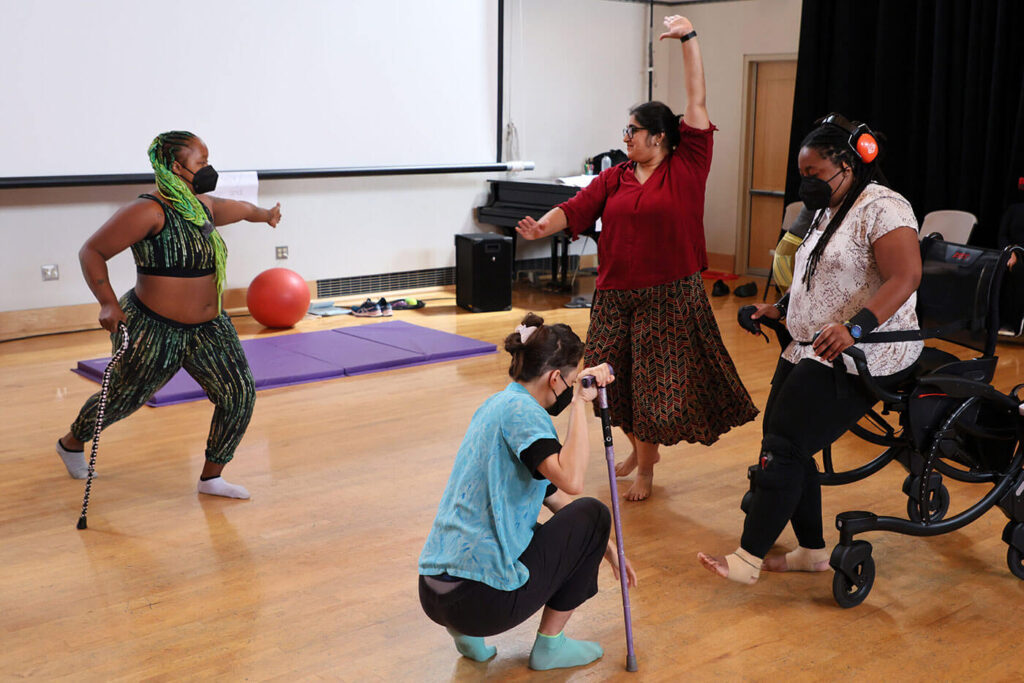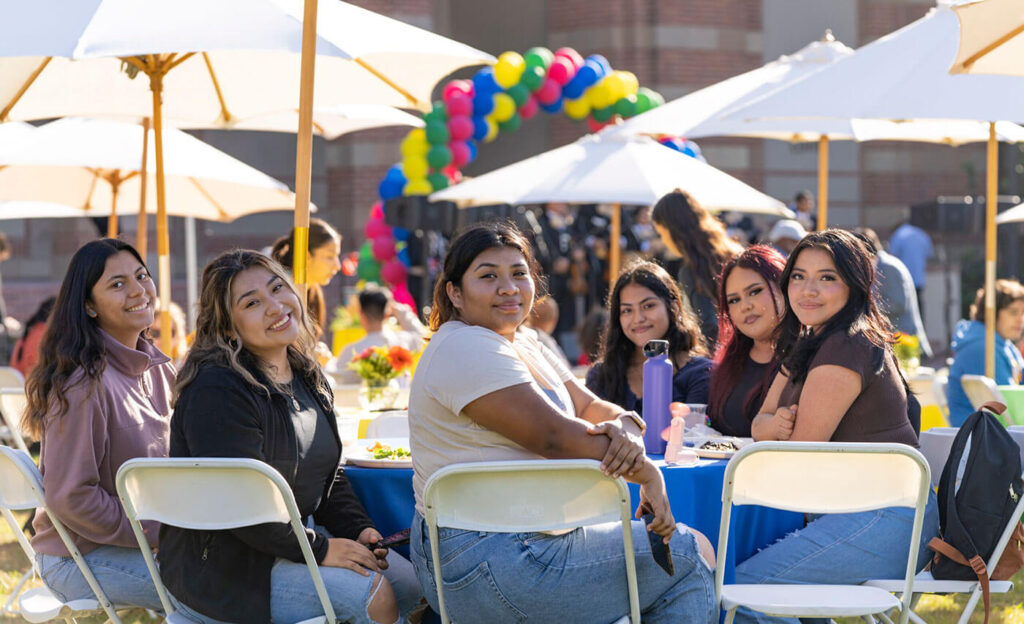
As I wrote to the campus last week, it is a very challenging moment for both our community and the world.
In a dark time, I would like to share a few bright spots. My Fall 2023 Update celebrates the opening of the UCLA Nimoy Theater, the launch of our new disability studies major, and our progress towards federal designation as a Hispanic-serving Institution (HSI).
In this issue
- A New Arts Space in Westwood
- UCLA Launches Interdisciplinary Disability Studies Major
- On the Road to Becoming an HSI
A New Arts Space in Westwood

The start of the fall quarter marked the opening of the UCLA Nimoy Theater, a new performing arts space on Westwood Boulevard managed by UCLA’s Center for the Art of Performance. This revitalized venue, formally the Crest Theatre, is a wonderful new addition to UCLA’s arts venues that will host a range of performances, talks, exhibitions and workshops throughout the year, with artists from both around the globe and closer to home.
Named for the late actor, artist and philanthropist Leonard Nimoy, the theater’s acquisition was facilitated by a generous gift from his widow, Susan Bay Nimoy. The theater stands out for prioritizing access, offering tickets at $32 for the nearly 50 shows throughout the CAP UCLA season. It will feature a diverse group of artists from various disciplines, including poet in residence, Grammy winner and Nimoy opening-night performer J. Ivy, who will return multiple times over the season.
Physically, the Nimoy is a remarkable space. Its gleaming marquee is truly the highlight of the block it sits upon. It emphasizes sustainability, safety and accessibility in its new design, while maintaining some of the aesthetics of the former Crest Theatre, including murals of old Hollywood painted on the walls. And keen eyes will note the phrase “Live Long and Prosper” — an iconic line from Leonard Nimoy in his role as Spock on Star Trek — displayed above the doors of the venue.
The Nimoy’s opening is worth celebrating particularly because this is a time in which some other arts institutions are pulling back. By investing in this space, UCLA is demonstrating a commitment to our Westwood neighborhood and to ensuring that the arts are accessible to all Angelenos. The dedication of our staff, faculty and donors in bringing the Nimoy to life has been inspiring.
As the school year gets underway, I encourage everyone to explore and immerse themselves in the rich array of arts and culture programs at UCLA — even beyond those at the Nimoy. Engaging with the arts profoundly enriches our understanding of one another, our world and our place within it.
UCLA Launches Interdisciplinary Disability Studies Major

With the launch of the new interdisciplinary bachelor’s of arts in disability studies, UCLA has become the first institution within the UC and Cal State systems to offer a major in this critically important area of study. This is a milestone in our efforts to move closer to our goal of inclusive excellence and a demonstration of how our disability studies scholarship has evolved over the last three decades. The launch of the new major builds on the establishment of the disability studies minor 16 years ago.
In developing this major, UCLA’s scholars and students have challenged attitudes and changed conversations surrounding disability by adopting a multi-disciplinary approach that draws on fields as wide ranging as nursing, music, dance, law, education, literature, genetics and more. Though society often frames disability around exclusion and efforts to repair perceived limitations, Bruins are looking beyond this traditional view and its focus on medical intervention, instead considering disability as a socially constructed phenomenon. This viewpoint recognizes that much can be learned from disability culture and the lived experience of those with disabilities.
This program — like gender studies, African American studies, LGBTQ studies, Jewish studies and other programs — is part of a larger UCLA effort to understand human identities in the context of their histories and experiences. Toward that goal, we have approved two full-time faculty positions splitting time between the disability studies program and other departments. In addition, the program will offer an activist-faculty collaboration as well as ongoing disability studies inclusion labs, which create opportunities to explore how we can make activities like dancing or social media more accessible. An additional element of this program — one that is fairly unique to UCLA — is the opportunity to engage with our robust health system to explore the medical and social dimensions of disability.
UCLA strives to advance access, justice, equity, diversity and inclusion on our campus and beyond. The disability studies major is foundational to these efforts and will help us build a more welcoming world for the 1.3 billion people on this planet experiencing a significant disability.
On the Road to Becoming an HSI

UCLA is closer than ever to realizing a vision that has been years in the making.
In 2020, we set our sights on a critical goal – to achieve federal designation as a Hispanic-serving Institution (HSI) — and I am proud of our progress toward this aim and of our efforts to cultivate a campus culture that prizes diversity, inclusion and student success.
The decision to pursue the HSI designation, which requires that 25% of our undergraduates identify as Latinx, is tied to our public responsibility in light of changing population demographics within California and the nation. As a state institution, our campus should reflect California’s rich diversity and play a central role in educating its next generation of leaders.
Last academic year, 22.2% of all UCLA undergraduates identified as Latinx. Change is accelerating: this fall, 24% of our newly-enrolled students identify as Latinx. This enrollment trend is the result of increased community outreach and recruitment efforts, partnerships with community colleges, and the establishment of new financial aid and scholarship opportunities.
While meeting the enrollment threshold set by federal legislation is key to designation as an HSI, sustaining that designation will rely on building an inclusive campus culture. We must make UCLA a welcoming place for Latinx students and create an academic ecosystem that supports their success. I am proud to report that we have made great strides on these fronts.
I am deeply grateful to Inaugural HSI Director Elizabeth Gonzalez for leading efforts like the HSI Visioning Forum, staff briefings, student town halls, alumni gatherings and the Latinx Welcome — a wonderful student celebration that took place earlier this month. Under her, UCLA has also established student liaisons and launched the HSI Fellows Program to actively address the needs of Latinx students.
On the academic side, we are very proud to welcome to UCLA 13 new faculty members whose teaching, scholarship or mentorship tie to Latinx experiences. The Chicano Studies Research Center played a crucial role in coordinating this remarkable set of hires, and over the 2023-2024 academic year, it will manage the recruitment of nine additional faculty. These scholars will enhance our research, curriculum, mentorship opportunities, training programs and partnerships.
With our HSI initiative, UCLA is expanding efforts across campus to create an inclusive environment and advancing UC-wide goals to better support our state’s diverse population. Other critical work in this area includes our effort to achieve designation as an Asian American and Native American Pacific Islander-Serving Institution (AANAPISI) and initiatives supporting a more diverse faculty, a thriving Black Bruin community, and Native Americans and Pacific Islanders on our campus.
With each step we take, we will shape the future of UCLA and make our institution a beacon of equity, excellence and inclusion.
